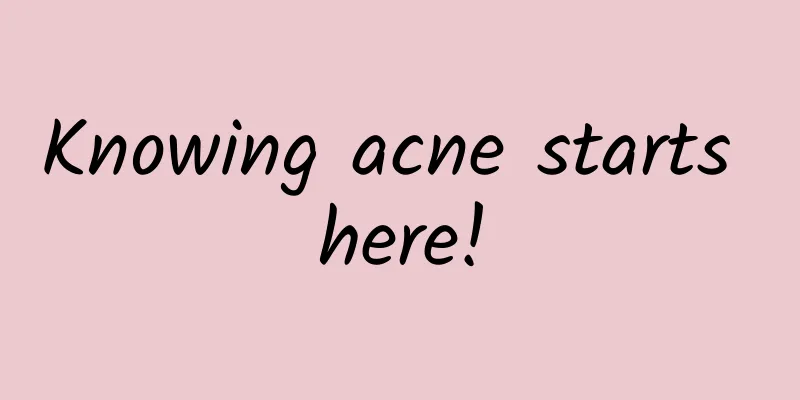Knowing acne starts here!

|
Author: Cai Lin, Chief Physician, Peking University People's Hospital Reviewer: Yang Dingquan, Chief Physician of China-Japan Friendship Hospital Acne, medically known as acne vulgaris, can also be simply referred to as acne. It is common in teenagers, and may start to appear in their teens. It may also appear in young and middle-aged people, that is, in their thirties. Some elderly people may also develop acne. In addition, it is a recurring disease. Some people may ask, after curing acne this time, can I never have acne again in my life? Unfortunately, because the possibility of recurrence is still relatively high. 1. What causes acne? The first reason is that our androgen levels rise during puberty, androgen promotes the development of male and female secondary sexual characteristics, and also promotes the secretion of skin oil. Therefore, many children develop acne after entering puberty, and the pores around their noses also become larger. The second reason is that the sebaceous glands of the hair follicles begin to develop and secrete sebum. If the sebum secretion is excessive and the keratinization of the cells at the opening of the sebaceous glands of the hair follicles is abnormal, resulting in blockage of the sebaceous gland opening, the sebum cannot be discharged normally, forming acne and inducing acne. The third reason is that when the sebaceous glands secrete more sebum, it is conducive to the growth and reproduction of Lactobacillus acnes, and the lipase and fatty acids secreted by Lactobacillus acnes will damage the hair follicles. The fourth reason is that the sebaceous glands produce an inflammatory reaction visible to the naked eye under the stimulation of Lactobacillus acnes. Figure 1 Original copyright image, no permission to reprint In summary, the four main causes of acne are elevated androgen levels, blockage of the sebaceous gland openings of the hair follicles, and Propionibacterium acnes leading to damage to the hair follicles and the resulting inflammatory response. 2. Who is more likely to get acne? First, people with genetic problems. Many studies have found that if both parents have oily skin and are prone to acne, then the child's probability of getting acne after he or she is in his or her teens can reach 50%, because he or she also has an oily constitution, which is a genetic problem. Second, people who like to eat spicy, greasy, sweet and other stimulating foods, especially some foods produced by hormones, should try to eat less, including eating less sweets and drinking less sweet drinks, because sweets are definitely related to acne, so eat less sweets and drink more boiled water. In addition, there is some controversy about some milk products, because some milk products may contain certain hormone components and some active substances, and current studies have found that some milk products can easily cause acne to worsen. Third, people who have high stress and fast pace of life, because mental factors are also one of the factors that aggravate acne. Clinical data shows that female acne patients over the age of 25 account for 17% of all acne patients, while male patients only account for 3%. This is directly related to women’s excessive mental stress or fast pace of life. Therefore, they should not be too tired, as fatigue will also aggravate acne. Fourth, people who often stay up late. Some young people nowadays often surf the Internet at night and go to bed late. This is also a high-risk factor, that is, irregular and unhealthy living habits, which can easily lead to aggravation of acne. Fifth, people who love to drink and smoke. Especially smoking, the harm of smoking is not only easy to cause lung cancer, but also aggravate acne, so we now call on everyone to quit smoking as much as possible. 3. What are the treatments for acne? Before choosing an acne treatment plan, the patient's condition must first be graded. Different levels of acne require different treatments. For example, mild acne is often dominated by white pimples without obvious red rashes. It can usually be alleviated by improving lifestyle or using some topical medications. The commonly used drugs are retinoic acid drugs. We need to remind everyone that this type of drug has a certain degree of photosensitivity and should be used at night. Figure 2 Original copyright image, no permission to reprint If used during the day, it can cause facial redness, desquamation, and even pigmentation, which is not good for improving facial skin, so remember that this type of medicine is to be used at night. If it is moderate acne, there are many red papules and pustules on the face, and there may also be some small nodules. Generally, it is necessary to use topical antibiotics under the guidance of a doctor. For severe acne, there are usually many pustules, cysts, and large nodules on the face, and patients often feel very painful. In this case, not only oral and topical anti-inflammatory drugs are needed at the same time, but also oral retinoid drugs may be needed. Here we would also like to remind everyone that retinoic acid drugs are highly teratogenic. Please pay attention to contraception during use and be sure to use them under the guidance of a doctor to avoid adverse consequences. |
>>: Fake medicine in hospitals
Recommend
What should pregnant women with anemia eat?
Pregnant women should pay more attention to their...
Is the third degree of leucorrhea cleanliness serious?
For women, normal leucorrhea is necessary to make...
It is said online that the latest research has confirmed that eating too many tangerines can cause cancer. Is this true or a rumor?
Recently, a piece of news about "Sugar orang...
How to eat to treat high blood pressure
For more dietary recommendations, please refer to...
The best exercise for fighting depression is revealed. The first one is not running or walking, but...
"Life lies in exercise." Exercise is no...
A type of food that makes your cholesterol soar, many people don’t know (it’s not eggs)
As living standards improve, our dining tables be...
How many types of rings are there?
IUD is the preferred contraceptive method for man...
Can I still have a baby if my uterus is thin?
Many women find that their uterine wall is relati...
Plasma cell mastitis and anger
Plasma cell mastitis is a type of breast disease ...
What should women do if they have kidney deficiency? Eat the right food and prepare well
Women with kidney deficiency must pay attention t...
Will my period be delayed if I take anti-inflammatory drugs for half a month?
Some female friends may have their menstruation i...
Childlike smiles, the secret to protecting a "little face": a complete guide to children's facial paralysis
Introduction: The “little mischief” on the little...
How many days after menstruation do you ovulate
As we all know, women's physiological cycle i...
Can I eat mandarin fish during menstruation?
Women can actually eat any kind of fish without w...
How to remove red acne marks
For some people who are particularly prone to acn...









